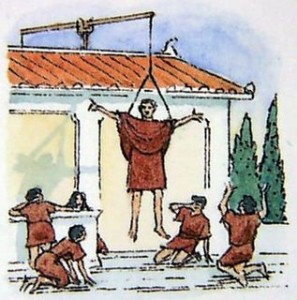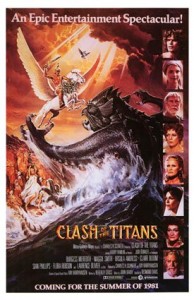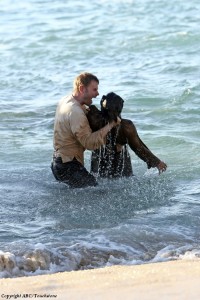Lost In Myth: “Ab Aeterno”-Cadabra! And the Island Is…A Cork??
 In “Ab Aeterno,” Richard Alpert loses his faith after discovering that the plan he’s dedicated so much of his life to, may in fact, not exist. From the very same episode, some Lost fans began feeling the same. For six years, Lost viewers with an insatiable hunger for answers have anxiously waited to find out what the mysterious island actually is. At the writer’s strike a couple years ago, Carlton Cuse held up a picket sign that read: “Do You Want To Know What The Island Is??” Thousands of fans have dreamed up imaginative theories, all in an attempt to solve the show’s complex riddle. And now at last we have our answer! According to Jacob himself, the island is…A CORK!!! (crickets)
In “Ab Aeterno,” Richard Alpert loses his faith after discovering that the plan he’s dedicated so much of his life to, may in fact, not exist. From the very same episode, some Lost fans began feeling the same. For six years, Lost viewers with an insatiable hunger for answers have anxiously waited to find out what the mysterious island actually is. At the writer’s strike a couple years ago, Carlton Cuse held up a picket sign that read: “Do You Want To Know What The Island Is??” Thousands of fans have dreamed up imaginative theories, all in an attempt to solve the show’s complex riddle. And now at last we have our answer! According to Jacob himself, the island is…A CORK!!! (crickets)
While cynical viewers have assumed for some time that the creators of Lost were going to pull a solution out of their collective ass, not even the most pessimistic among them ever mentioned that they’d be pulling out a cork. While I still have faith that there is still something more interesting going on, “Ab Aeterno” gave me a bit to be concerned about. Sure, the story itself was intriguing and many answers were revealed. But those answers were less than spectacular. And given that all those answers were dreamed up in the early seasons it got me thinking, what if all the answers to this brilliant show are just really dull?
What if the ghosts seen on the island are actually, well, ghosts—or an impersonation by the “black smoke thingie”? What if the whispers are just the voices of those ghosts? What if that black smoke thingie is just some sort of evil entity trapped on the island? What if the numbers are just random numbers assigned by a god-like being named Jacob to find his replacement? What if Richard Alpert hasn’t aged simply because he asked for it and Jacob touched him? What if the Black Rock got to the middle of the island because Jacob caused a giant storm wave to bring it there? What if doing this caused the four-toed statue to topple? And what if the island really is nothing more than a metaphorical cork in a bottle to contain the black smoke thingie? In other words, what if the answers to Lost all turn out to be the stuff of Deus Ex Machina?
 If this turns out to be the case, well, we have been warned. Episode 19 of Season 1 took “Deus Ex Machina” as its title. Perhaps this was the writers’ way of trying to reduce our expectations. For those who don’t know, the term dates back to ancient Greek theater when a statue or actor representing a deity (deus) would be lowered onto the stage by a pulley system (machina) in order to magically resolve overly complicated entanglements of a plot (“Zeus saved us!”). The term came to be used whenever any artificial or improbable device was used to solve plot difficulties. In other words, using gods with magical powers to solve all the mysteries of Lost.
If this turns out to be the case, well, we have been warned. Episode 19 of Season 1 took “Deus Ex Machina” as its title. Perhaps this was the writers’ way of trying to reduce our expectations. For those who don’t know, the term dates back to ancient Greek theater when a statue or actor representing a deity (deus) would be lowered onto the stage by a pulley system (machina) in order to magically resolve overly complicated entanglements of a plot (“Zeus saved us!”). The term came to be used whenever any artificial or improbable device was used to solve plot difficulties. In other words, using gods with magical powers to solve all the mysteries of Lost.
Personally, I don’t feel that these answers have really been all that bad, they just haven’t been up to par with the many brilliantly written story twists we’ve seen on the show up until now. Plus, all the “god” stuff so far is pretty much falling in line with where the show has been heading, and was hinted at in earlier seasons with the hieroglyphs and the statue. But if someone had come up with a theory several years ago claiming to have all the answers to Lost, and their answers were exactly those that are now being provided, would you have found them gripping? I don’t think I would’ve.
 I know there are many fans out there that really dig the whole magical island thing. They compare the story to classical mythology where gods could make things happen to save the protagonist and it was pretty cool when they did. I think back to my favorite classical myth movies like the original Clash of the Titans, Jason and the Argonauts, and The 7th Voyage of Sinbad. All of those movies had gods or genies interfering to help the heroes, and I loved it. So what’s the difference here? The difference for me is that those magical beings were introduced at the start of the stories, not in its final acts. If you’re going to stretch out a mystery about how an enormous statue toppled and how a ship got to the middle of an island, the answer should be somewhat more imaginative than a god-like being causing it with a giant wave.
I know there are many fans out there that really dig the whole magical island thing. They compare the story to classical mythology where gods could make things happen to save the protagonist and it was pretty cool when they did. I think back to my favorite classical myth movies like the original Clash of the Titans, Jason and the Argonauts, and The 7th Voyage of Sinbad. All of those movies had gods or genies interfering to help the heroes, and I loved it. So what’s the difference here? The difference for me is that those magical beings were introduced at the start of the stories, not in its final acts. If you’re going to stretch out a mystery about how an enormous statue toppled and how a ship got to the middle of an island, the answer should be somewhat more imaginative than a god-like being causing it with a giant wave.
Now that I’ve vented for a bit, I’d like to take a step back. I’ve been exaggerating somewhat to prove a point and the reality isn’t nearly as god-awful. Let’s take the whole cork thing. First of all, the island isn’t really “a cork.” It’s a metaphorical cork that is bottling up evil. Sounds to me as though the island is actually some kind of demon prison. And knowing that Lost loves to dabble in symbolism and metaphor, and knowing that the Man In Black has admitted to being human at one time with a crazy mum, I think it isn’t a stretch to guess that this demon prison is really more of a really intense maximum-security jail…or the inside of a magic lamp with the black smoke monster as the genie.
I don’t like the magic lamp idea any better than a magical island so let’s stick with the whole jail thing. Okay, what else do we know? We know that Jacob had brought a whole bunch of other folks to the island, and that at the time Ricardo arrived, they were all dead. We also know that at the time of his arrival, Ricardo was considered a criminal. Interestingly, many others who have been brought to the island have also been criminals. These include (but are not limited to): Kate, Sawyer, Ana Lucia, Mr. Eko, Sayid, Charlie, Nikki, Paulo, and Jin. Interestingly, the island seems to tempt these criminals with the exact same issue that caused them to be criminals to begin with. So Charlie was tempted with drugs, Ana Lucia with use of her overactive trigger finger, Sawyer with revenge, Sayid with torturing, etc. When these characters are able to get over their issues, the island kills them. So, Charlie resisted the drugs and unselfishly sacrificed himself for others, Ana Lucia did not shoot Ben despite his aggressive treatment of her, and Mr. Eko was able to clear his conscience about what happened to his brother. As for Nikki and Paulo, well, technically the island didn’t kill them, the Losties accidentally did, and the writers did admit they were a mistake, so we’ll just consider them an oversight for purposes of this theory.
Besides the criminals, it seems that everyone else on the island has deep-seated issues, and like the criminals, when they overcome them, they die. Yet, are they really dead? In the flash-sideways, many of the Losties who we saw die like Boone, Charlie, and (presumably) Shannon, are very much alive. And let me throw in just one more clue Scooby before we begin to solve this mystery: Jeremy Bentham.
Locke’s first alter ego never really seemed to have much of a purpose on Lost, yet, I’ve always felt that the name itself was a solid hint. In The Myth of Lost I bring up the real inspiration behind the name:
Jeremy Bentham was a philosopher and social reformer whose work led to the development of liberalism. One of Bentham’s more important contributions was his design for a prison known as the Panopticon. The concept behind the prison is that it would enable someone to observe the inmates without them being able to tell if they were being observed or not—just like cameras in department stores or pretty much everywhere these days. This feeling of constantly being watched would convey a sense of an “invisible omniscience” and, according to Bentham, enable “a new mode of obtaining power of mind over mind.”
![]() What’s particularly interesting is that I wrote about Mr. Bentham in the book a full year before his name was actually revealed on the show. So, why did I think the name would eventually be used? Because I felt that the island was a rehabilitative program of sorts. One where the “prisoners” could be viewed without their knowing it—just as we’ve seen with the lighthouse. But what if the lighthouse was just a way to get the prisoners’ histories, and the island itself is a way to watch their progress? And once they were “cured” as determined by the powers that would be watching, they would be allowed to leave. So far, those who have died could have been rehabilitated and released back into the real world. The Man In Black however, has received a life sentence and will never be allowed to leave. But much like Lex Luthor or other brilliant villains of lore however, he has a mastermind plan to enable his escape.
What’s particularly interesting is that I wrote about Mr. Bentham in the book a full year before his name was actually revealed on the show. So, why did I think the name would eventually be used? Because I felt that the island was a rehabilitative program of sorts. One where the “prisoners” could be viewed without their knowing it—just as we’ve seen with the lighthouse. But what if the lighthouse was just a way to get the prisoners’ histories, and the island itself is a way to watch their progress? And once they were “cured” as determined by the powers that would be watching, they would be allowed to leave. So far, those who have died could have been rehabilitated and released back into the real world. The Man In Black however, has received a life sentence and will never be allowed to leave. But much like Lex Luthor or other brilliant villains of lore however, he has a mastermind plan to enable his escape.
 The whole “cork” thing might really just be the writers trying to reduce our expectations. But I do not believe the answer ends here. Even if it does though, the mythological messages are still very relevant. Whether the island is a prison of sorts, or hell, or a cork to contain evil, since it is a microcosm of our world, the meaning is pretty much the same. Hell is not a place you go when you are bad. As Matt Groening would probably agree—life is hell. Our world is the mythological embodiment of hell. You, and everyone else here (sans a few select Bodhisattvas and chosen guides), are here because you’ve got issues to work through. If you don’t work through them, you’ll get to try again in your next life on earth. If you do work through them, you’ll get a new set of issues. Having the issues is what makes life interesting and something like a game. They give you challenges to overcome. Without them, life would be peaceful, happy, perfect, and incredibly dull.
The whole “cork” thing might really just be the writers trying to reduce our expectations. But I do not believe the answer ends here. Even if it does though, the mythological messages are still very relevant. Whether the island is a prison of sorts, or hell, or a cork to contain evil, since it is a microcosm of our world, the meaning is pretty much the same. Hell is not a place you go when you are bad. As Matt Groening would probably agree—life is hell. Our world is the mythological embodiment of hell. You, and everyone else here (sans a few select Bodhisattvas and chosen guides), are here because you’ve got issues to work through. If you don’t work through them, you’ll get to try again in your next life on earth. If you do work through them, you’ll get a new set of issues. Having the issues is what makes life interesting and something like a game. They give you challenges to overcome. Without them, life would be peaceful, happy, perfect, and incredibly dull.
 Dull, however, is still considerably better than torturous—yet this is exactly how hell is typically depicted in mythology. In Greek mythology alone there is Sisyphus who must continually roll a boulder up a hill only to watch it roll down again. Also famous in Greek mythology is Tantalus who was condemned to stand in a pool of sparkling water with delicious fruits dangling above him. Only, when he goes to reach for the fruits, they move out of his grasp, and when he tries to drink the water, it recedes before he can get a sip. These myths reminded me of Ricardo’s efforts on the Black Rock as he tries to sip the rainwater that was just out of his reach. So, is this suffering better than boredom?
Dull, however, is still considerably better than torturous—yet this is exactly how hell is typically depicted in mythology. In Greek mythology alone there is Sisyphus who must continually roll a boulder up a hill only to watch it roll down again. Also famous in Greek mythology is Tantalus who was condemned to stand in a pool of sparkling water with delicious fruits dangling above him. Only, when he goes to reach for the fruits, they move out of his grasp, and when he tries to drink the water, it recedes before he can get a sip. These myths reminded me of Ricardo’s efforts on the Black Rock as he tries to sip the rainwater that was just out of his reach. So, is this suffering better than boredom?
Often, we are the cause of our own suffering. This has certainly been the case of most of the characters on Lost. Yes, shit happens here in hell. But as I wrote in “The Message of “Recon”—Learning to Let Go,” we can choose to carry that pain with us our whole lives, or learn to let go. As Ricardo’s wife Isabella tells him at the end of the episode, it was simply her time to go, and there wasn’t anything he could’ve done about it. Carrying around guilt and pain would not bring her back. The only thing that could, would be to honor her memory and act as she would have. Upon that realization, Richard puts on his wife’s cross that he’d buried so long ago, restoring his positive memories of her and his own faith. Perhaps he was still in an allegorical hell, but at least now, he could be at peace there.
 Another theme brought up by this episode is that of sin. Jacob tells Ricardo that he doesn’t care about the pasts of those he brings to the island. They all have a clean slate (Tabula Rasa), which he demonstrates by violently baptizing Ricardo in the ocean. The only thing Jacob does seem to care about, is the choices people make. It wouldn’t be free will if he had to tell people what was right or wrong. All he does is provide the challenges and hope the people will be able to make the right choice for themselves. There’s that “challenge” concept again—you know, the thing that makes life interesting, or put another way, like a game.
Another theme brought up by this episode is that of sin. Jacob tells Ricardo that he doesn’t care about the pasts of those he brings to the island. They all have a clean slate (Tabula Rasa), which he demonstrates by violently baptizing Ricardo in the ocean. The only thing Jacob does seem to care about, is the choices people make. It wouldn’t be free will if he had to tell people what was right or wrong. All he does is provide the challenges and hope the people will be able to make the right choice for themselves. There’s that “challenge” concept again—you know, the thing that makes life interesting, or put another way, like a game.
Currently, one challenge I’m trying to come to terms with, is how I can rationalize the amount of time and energy I’ve put into a show if it all turns out to have a pretty lousy resolution. A couple years ago, I read Jason Hunter’s time-loop theory about how the Black Rock was carrying metallic minerals and was yanked onto the island by its magnetic core, and in the process, punched a hole in the invisible bubble that surrounds the island at the coordinate “305”—the one needed to escape without getting the sickness. At the time, while I thought the idea was intriguing, I figured the writers had a bigger plan. Now that I see their plan, I feel that Hunter’s theory was more imaginative. At least it connected with the other mysteries of the island.
Then there’s the whole literal hell thing. Anthony Cooper alluded to it in Season 3 when he asked Sawyer where he thought he was. “It’s too hot for heaven,” he continued. Fans had been claiming hell or purgatory ever since Season 1. Could that have been it all along? What if fans figured out all the answers to Lost after the first several episodes so the writers simply made it increasingly more complicated just to keep it interesting? Even if this turns out to be the case, I’d like to submit my own feelings on the issue: it doesn’t matter. In fact, this is the main message of the episode.
In “Ab Aeterno,” Richard has become disillusioned after blindly following someone he thought had a plan. While Richard hasn’t been alive “for eternity” as the title’s Latin translation would suggest, surely it’s felt that way to him—an eternity in hell. After dedicating his life for 140 years, Richard finds out that there was no plan after all. As with all episodes of Lost, once again the message is for us. This time however, it may specifically be just for fans of the show.
For years, many of us have invested our lives in a mysterious show that has promised answers. So far, those answers haven’t been particularly satisfying for many of us. But even if the final reveal isn’t all that enlightening, it might give us comfort to realize that the show isn’t about the final reveal. Like life, Lost is a journey, not a destination. Over the years, we’ve learned that we get clues to our destiny, that we’re all connected, there are no coincidences, and that we shouldn’t judge people without knowing their full story. We’ve learned about constants, variables, proxies and parallel timelines. Lost has helped us solve the mysteries of our own lives, and for that, it’s already been worth it, even if the ending totally blows. But there is more to be hopeful about.
There’s another way to interpret the message of this episode. By the end, Richard decides to keep the faith in Jacob even though it seems like he never had a plan. But, what if he does? What if there is a much bigger plan and Richard, the Losties, and everyone else who’s ever stepped foot on the island are still a part of it? In fact, what if we are all still a part of it? Personally, I’m keeping my faith that there will be some kind of cool twist at the end of Lost that will make sense out of most of the mysteries. But even if there isn’t, I still consider Lost to be one of the best written, most intelligent, meaningful, intriguing and entertaining shows ever created in the history of television. And for those insist otherwise, well, they can stick a cork in it.
Marc Oromaner is a New York City writer whose book, The Myth of Lost offers a simple solution to Lost and uncovers its hidden insight into the mysteries of life. He can be contacted in the discussion section of The Myth of Lost Facebook page.
The Myth of Lost is available on Amazon and barnesandnoble.com.



One Response Leave a comment